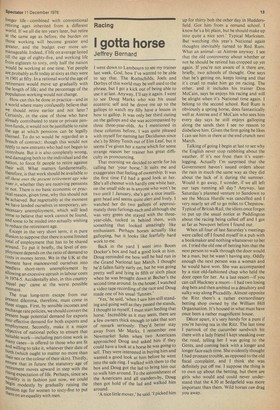Too retiring
Douglas Jay
How many people realise that one major cause of our budget and tax problems is the increasing age of the population, together with our failure to provide useful work for all those over sixty who would like to find it ? It is not governments, but the arithmetic of population, combined with an absurd convention of retiring at sixty or sixty-five, which is making the budget unmanageable. Some 41.8 per cent of the population of Great Britain are now either above retirement age or below school-leaving age. This compares with only 29.9 per cent in 1931. As many as 22.7 per cent are now above retirement age. The corresponding percentage represented by old people was only 16.9 per cent in 1948, 9.6 in 1931 and 3.7 in 1901. The actual number of individuals over retiring age has risen from 1,018,000 in 1901 and 3,316,000 in 1931 to 9,308,000 in 1975. As a result of our laudable efforts to give the young a better and longer education, and both the young and old a higher living standard, the increase in budget expenditure on pensions and education, even since 1950, has been staggering. In crude sterling terms, total annual benefit paid to pensioners from the budget has risen from £300 million in 1950 to £4,899 million in 1975. And education spending is up from £354 million to £6,840 million. Naturally this jump is partly, but only partly, due to falling money values. As a proportion of gross national product, pension benefits have risen from 2.2 per cent in 1950 to 4.7 per cent in 1975; and education expenditure from 2.7 per cent to 6.6 per cent. Thus it now takes over 11 per cent of our total national income, and nearly 20 per cent of our budget spending, to maintain the non-earning section of the population. No wonder the working half grumble about the 'burden' of taxation. But few of them seem to realise the stubborn fact that if nearly one half of the nation has to be maintained by the other half, then the working half will be forced to hand over a very large slice of their earnings in tax—however governments juggle with incomes, prices and social benefits. The prospect, if we stick to our present retirement ages, is that the load on the active workers will get much heavier. Already 29 per cent of the population over pension age are also over seventy-five. But this is expected to rise to 37 per cent or three and a half million people by the end of the century. Of course, already many old people are happily given the chance to work and earn if they want to—but not nearly enough. Out of the 9,308,000 now over pension age, as many as eight and a half million are drawing a state pension from the state. The cause of this major part of our budget dilemma is really simple: better health and
longer life—combined with conventional retiring ages inherited from a different world. If we all die ten years later, but retire at the same age as before, the burden on those working will become greater and greater, and the budget ever more un manageable. Indeed, if life on average lasted till the age of eighty-five, and working life
from eighteen to sixty, only half the nation would be working at one time. Yet people are probably as fit today at sixty as they were in 1901 at fifty. In a rational world the age of retirement would move up gradually with the length of life; and the percentage of the Population working would not change.
How can this be done in practice—and in a world where many confusedly believe that we should retire earlier and not later? Certainly, in the case of those who have already contributed to state or private pension funds, it would not be justifiable to raise the age at which pensions can be legally Claimed. To do so would be regarded as a breach of contract ; though this would not apply to new entrants who had not begun to contribute. But it is also completely wrong, and damaging both to the individual and the nation, to force fit people to retire against their will. What matters fundamentally, therefore, is that work should be available to all those over the present retirement age Who 4'ant if, whether they are receiving pensions or not. There is no basic economic or practical reason, given time, why this should not be achieved. But regrettably at the moment we have landed ourselves in temporary, unnecessary unemployment, which will lead some to believe that work cannot be found, and some to be misled into actually wishing to reduce the retirement age.
• Except in the very short term, it is pure Illusion to suppose that there is some limited total of employment that has to be shared around. To put it briefly, the level of emDloYment depends on the ratio of demand to costs in money terms. We in the UK at the Moment have manoeuvred ourselves into needless short-term unemployment by allowing an excessive uprush in labour costs itt 1974-5. Accidentally also, in this country equal pay' came at the worst possible Moment.
The true long-term escape from our Present dilemma, therefore, must come in three stages. First, by sensible incomes and exchange rate policies, we should convert the present huge potential demand for exports Into effective demand for both exports and etY1,.PloYment. Secondly, make it a major objective of national policy to ensure that suitable work—including part-time work in many cases—is offered to those who are fit abn. d willing to take it, whatever their date of Irth (which ought to matter no more than their sex or the colour of their skin). Thirdly, .ensure that in future the statutory age of tlrement moves upward in step with the re' . eising expectation of life. Perhaps, since sex LqUality is in fashion just now, we could h_uegln modestly by gradually raising the .7nston age for women to sixty-five to put 'nem on an equality with men.



































 Previous page
Previous page